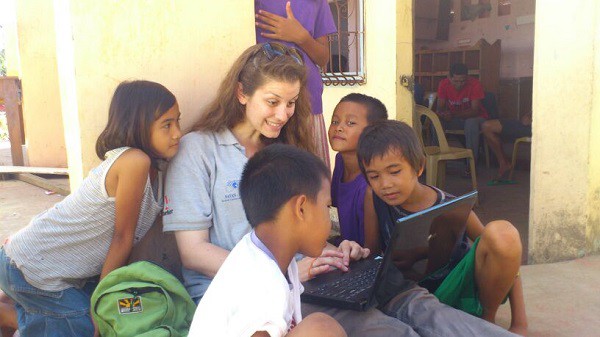8th November 2013. Friday. I watch the news. A powerful typhoon struck the Philippines. Something in my heart moves. My thoughts are with people on the other side of the world, who have lost everything. The pictures are harsh. The reports on the extent of the damage are difficult to comprehend. The knowledge that in a day or two, the world will move on to the next news story does not let go.
Two weeks later, I’m on a plane. I’m part of a second delegation leaving for the disaster zone. With me are two wonderful female doctors and an equally wonderful trauma specialist. The next three weeks are difficult to describe in brief. Such a broad range of emotions and thoughts are possible perhaps only in such a situation.
The sights are harsh. In the first days they’re hard to get used to. Piles of ruins, difficult smells. People are searching. Searching for objects in the rubble, searching for a hint of a life that was washed away by a great wave or blown away by a strong wind. Slopes of coconut trees laying on the ground, their roots in the air. They also succumbed to the wind. The pastor sitting next to me in the car tells me about growing coconut trees. It takes a coconut tree ten years to bear fruit. I wonder where I’ll be in ten years, if I’ll remember these coconut trees. I probably will, it’s hard to imagine that I won’t as the images burn into my memory.
Villages, towns, roads and streets. More and more destruction. Children everywhere, no school. Some are happy and cheerfully play in the rubble, some stay close to their worried parents.
Deep and sincere compassion spreads throughout my body. Thoughts of family and friends back home, thoughts of the luck that befell us – we’re all intact, healthy, full and protected. Sometimes I think of someone specific, who I would like to be beside me, to feel what I feel, to understand. I know I won’t be able to explain it in words when I get back.
Going out on missions. Establishing temporary clinics in isolated villages. I see the wonderful doctors performing miracles. Committed to eliminating pain, stitching wounds. Maybe I should go to medical school? There is no more noble way to help a person than taking away pain. I try to help in other ways, registering patients, entertaining the children, smiling, listening.
Everyone wants to talk, to tell their story. Where they were during the typhoon, what they were doing, who they lost. There’s a strong presence of trauma. The intensity of the typhoon surprised everyone. Despite the fact the people here are used to some 20 typhoons a year, nobody expected Yolanda’s fortitude. Many tell us that with every drop of rain they’re taken back to the anxiety, to fear the typhoon return. I listen. To the patients in the clinic, to the local health workers, to people on the street, to the street vendors, to the drivers. Everyone wants to tell their story. Feelings of frustration and helplessness slowly turn into a sense of satisfaction. The delegation works and makes a difference, touches people’s lives. We can’t help everyone , but every smile is a world to itself.
Everywhere around there’s construction going on. New electricity pylons rise up to replace those that collapsed. Garbage and debris are loaded onto trucks and streets begin to return to life. Broken and fallen statues come alive. The delegation is here for 2 weeks and the city looks completely different. A bit of hope dares to penetrate to our hearts. There’s still plenty of work to be done, but every day small changes can be seen. Signs seeking help and food are exchanged with signs thanking those who have come to help.
After wandering around different areas I arrive to the island of Samar. The other members of the delegation return to Israel, I stay another week to prepare the infrastructure for the following delegation, expected to arrive soon. In the town of Guiuan more scenes of mass destruction. More stories of horrific experiences. This is a more isolated area, and few aid agencies have reached it. The place feels right, I decide to stay. Rain keeps falling. Every evening, there’s a coordination meeting of relief organizations. People from all over the world, of all races, colors and ages, cooperate in an exceptional manner. For a fleeting moment I feel a sense of utopia – here, in the destruction, utopia.
The next delegation arrives. I pass the baton. It’s time to go back. On the plane I recall all the moments. The lack of electricity, running water and internet forcing us to rethink what’s really important. The church and its’ wooden benches, on which we slept during the first nights. The day I forgot my laptop and the local lad who did everything he could to return it to me and all the faces and stories. The leader of a village which was completely destroyed, telling us about the burden placed on her shoulders, of the need to stay strong for her community. The children who played with me, who played with my camera, jumped around me and brought me into their world for one morning. The mass grave I was shown. The compassion, the frustration, the hope and great love that passed through me in this short time.
The doors at Ben Gurion Airport open. Family is waiting on the other side .
This is it. My body is here. My head is still there, and will probably be there for a while longer.
